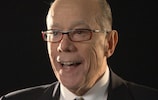Luis Suárez: Spain's first EURO superstar
Sunday, July 9, 2023
Article summary
One of the most successful footballers ever, Luis Suárez was a European champion with Spain and Inter; UEFA.com pays tribute following his death aged 88.
Article top media content

Article body
Described by Alfredo Di Stéfano as "the architect", Luis Suárez Miramontes remains one of the most decorated players in the history of the game, winning league titles in Spain and Italy, two European Champion Clubs' Cups, the UEFA European Championship and the Ballon d'Or.
After honing his skills on the streets of A Coruna with balls made from cloths, Suárez debuted for Deportivo La Coruña in 1953 aged 18. His time with his local team proved brief as he struggled to make his mark against senior players far older and tougher than him.
Barcelona took a chance on the attacking midfielder, who truly came into his own when Helenio Herrera arrived at the Camp Nou in 1958. The Argentinian coach was notoriously hard to please, but was instantly impressed by Suárez, calling him "a great organiser of teams" who "lived an exemplary life".
The Galician relished the importance Herrera gave him in a side brimming with the attacking talent of László Kubala, Evaristo de Macedo, Justo Tejada, Zoltán Czibor and Sándor Kocsis. Barcelona blossomed, winning a league and cup double in 1959 and then the league again the next year. In 1960 Suárez became the first – and so far only – Spanish-born man to claim the Ballon d'Or.
"I was the organiser," he said of his role in Herrera's team. "I started deep but covered a lot of ground and I had a wide perspective and vision. I had a change of pace, good technique and could shoot from outside the box."
Suárez came close to European glory with Barcelona in 1961, losing 3-2 to Benfica in a logic-defying European Cup final in which the Blaugrana hit the woodwork five times. That night in Berne was one of his last outings for Barça; that summer he joined mentor Herrera at Inter for a then record fee of 25 million pesetas, around €150,000.
"I don't think I would have ever agreed to leave Spain if it was not for Herrera," reflected Suárez. "He was well ahead of his time. His training sessions lasted half the time of other teams but we were twice as tired because of their intensity."
The feeling was mutual. "To build a great Inter side, I needed a great midfielder and Suárez was the best," explained Herrera. With Suárez the last piece in Herrera's jigsaw, Inter landed their first Serie A championship in nine years in 1963, and the following year lifted the European Cup, ousting Real Madrid 3-1 in the final.
"My best memory is definitely the Vienna final against Real Madrid for several reasons," Suárez reminisced a few years ago. "It was only then that we realised we were such a great team. We had beaten a fantastic side who had dominated European football. For me, a former Barcelona player, I got double satisfaction. I will never forget the light in the eyes of our president [Angelo Moratti] after our triumph in Vienna. If I was a painter and I had to paint 'happiness', I would try to reproduce those eyes."
Yet Suárez was not merely content to conquer Europe with his club: that same summer he helped Spain to glory at the UEFA European Championship on home soil. Then aged 29 and the nation's most senior player, he spearheaded a young squad to victories against Hungary in the semi-finals and the Soviet Union in the final.
Another European Cup triumph followed with Inter in 1965, this time over Benfica. The Nerazzurri got to the final again in 1967, although injury prevented Suárez playing any part in the defeat by Celtic.
Suárez saw out his playing days at Sampdoria, later returning to Inter for three different spells as coach. He also took charge of Spain at the 1990 FIFA World Cup though, despite his coaching career spanning two decades, Suárez was always more comfortable on the pitch. "I didn't go very far as a coach; I was better as a player," he admitted.
While there is a plaque to Suárez in A Coruna, he continues to live in Milan and has no regrets about moving from Spain to Italy 54 years ago. "I fancied the challenge of seeing if I could achieve something away from home," he said. "I left a huge team in Barcelona to go to an Inter side who, at the time, were not very well known around Europe. It was great because we won a lot of trophies and made Inter a great team."




